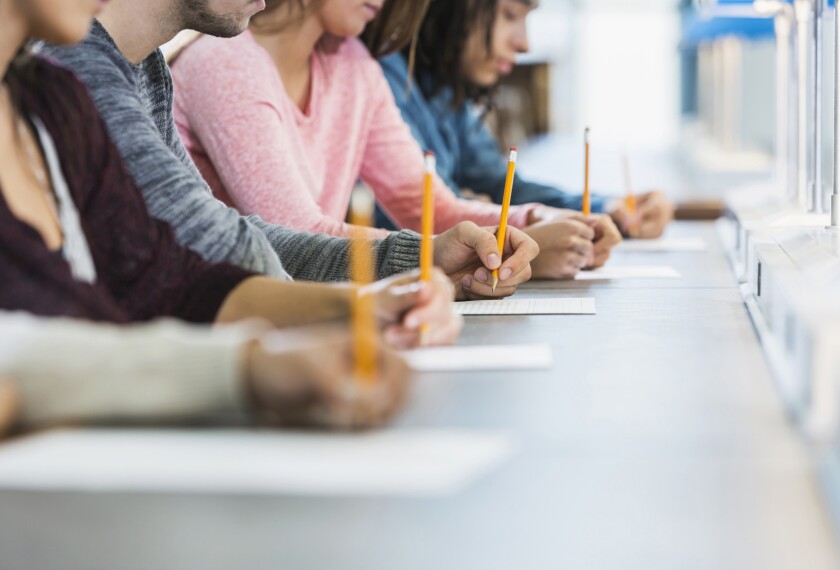A majority of educators find that state-mandated standardized tests aren’t useful in the classroom despite feeling a large amount of pressure to have their students perform well on those exams, according to new data from the EdWeek Research Center.
Just 25 percent of educators said state-mandated tests provide useful information for the teachers in their school in an online survey of 870 teachers, principals, and district leaders administered from July 26 through Aug. 20.
But nearly half of educators, 49 percent, said they feel more pressure now than before the COVID-19 pandemic to ensure students perform well on state tests. Forty-two percent of educators said the amount of pressure has remained about the same since 2019, while 9 percent said it has decreased.
The data come at a time when state and federal leaders are rethinking the value of end-of-year standardized tests, which critics argue only capture a snapshot of student achievement at a specific moment in time. In a speech to educators in January, U.S. Secretary of Education Miguel Cardona said standardized tests should be “a flashlight” on what works in education rather than “a hammer” to drive outcomes.
Cardona’s sentiment is shared by many educators, but it goes against more than two decades of federal education policy that has required annual testing and set out sanctions for lower-performing schools.
Nearly 80 percent of educators said they feel moderate or large amounts of pressure to have their students perform well on standardized tests. In the survey, educators said they’d like to see graduation rates, school climate surveys, and rates of teacher turnover and attrition used to measure school success over standardized test performance.
Standardized tests are “overwhelming,” said Olga Neurauter, principal of Longfellow Elementary School in Raton, New Mexico. “There’s too much pressure put on these kids for testing, and there’s too much testing. We need to be able to teach the curriculum, and sometimes when we do those state-mandated tests, it takes away” from learning.
In the survey, 41 percent of respondents said the amount of time they and teachers in their districts spend preparing students for standardized tests has grown since 2018-19, the last full school year before the pandemic. Forty-nine percent said they spend about the same amount of time, and 10 percent said they spend less.
Educators find year-round testing more useful
Only a quarter of educators who responded to the survey said they found state-mandated standardized tests useful. At the same time, 74 percent said they find in-class, teacher-created, formative assessments to be useful, 59 percent said unit tests and final exams are useful, and 50 percent said diagnostic exams created by teachers at the start of the year are useful.
In conversations with Education Week, teachers said they find diagnostic exams like I-Ready, which is administered multiple times throughout the year, to be the most useful for guiding classroom instruction, compared with state-mandated standardized tests.
“I use the results from the I-Ready English [exam] when I group my students to differentiate instruction,” said Nino Cuzco, a middle school Spanish teacher in New York. “For example, if I have a student who scores low on the ELA I-Ready, I know they will need more support in my classroom because when I teach Spanish there may be vocabulary or grammatical concepts they may be lacking in background knowledge.”
The I-Ready exam has also been helpful in determining when students need interventions to help them get on track, Cuzco said. Cuzco said she’s also found New York’s state-mandated tests, which are administered to students in 3rd through 8th grade every spring, to be useful in determining students’ skill levels. But the I-Ready tests give a better sense of student growth throughout the year, she said.
Standardized tests often just feel like a snapshot with little useful information for educators, said Nanette Murray, an English language development teacher in Tucson, Ariz.
Teachers already have a good understanding of where their students are academically through their work in the classroom, Murray said.
“We’re spending a gazillion dollars for a tiny piece of information,” Murray said.
A push for less emphasis on standardized tests in school accountability
Graduation rates, school climate surveys, and teacher turnover rates were all more popular ways to measure school performance among educators than standardized tests, according to the survey.
Cuzco said that she finds standardized tests useful in providing a sense of students’ academic performance, but she doesn’t think they should drive school accountability, especially as students are struggling to recover from the COVID-19 pandemic.
“My opinion may have been different 10 years ago or so,” Cuzco said. “Now I know there is generational trauma and every child is going to jump back from it in a different way or need different support, but I am seeing learning gaps. The tests do show that.”
Murray would like to see lawmakers find a way to measure schools based on parent engagement, including levels of parent outreach and parent support. Parents play a large role in helping students succeed, and schools should work to facilitate that, she said.
“69��ý need to be held accountable for meeting the kids and the parents where they are and giving them the supports they need to succeed,” Murray said.






